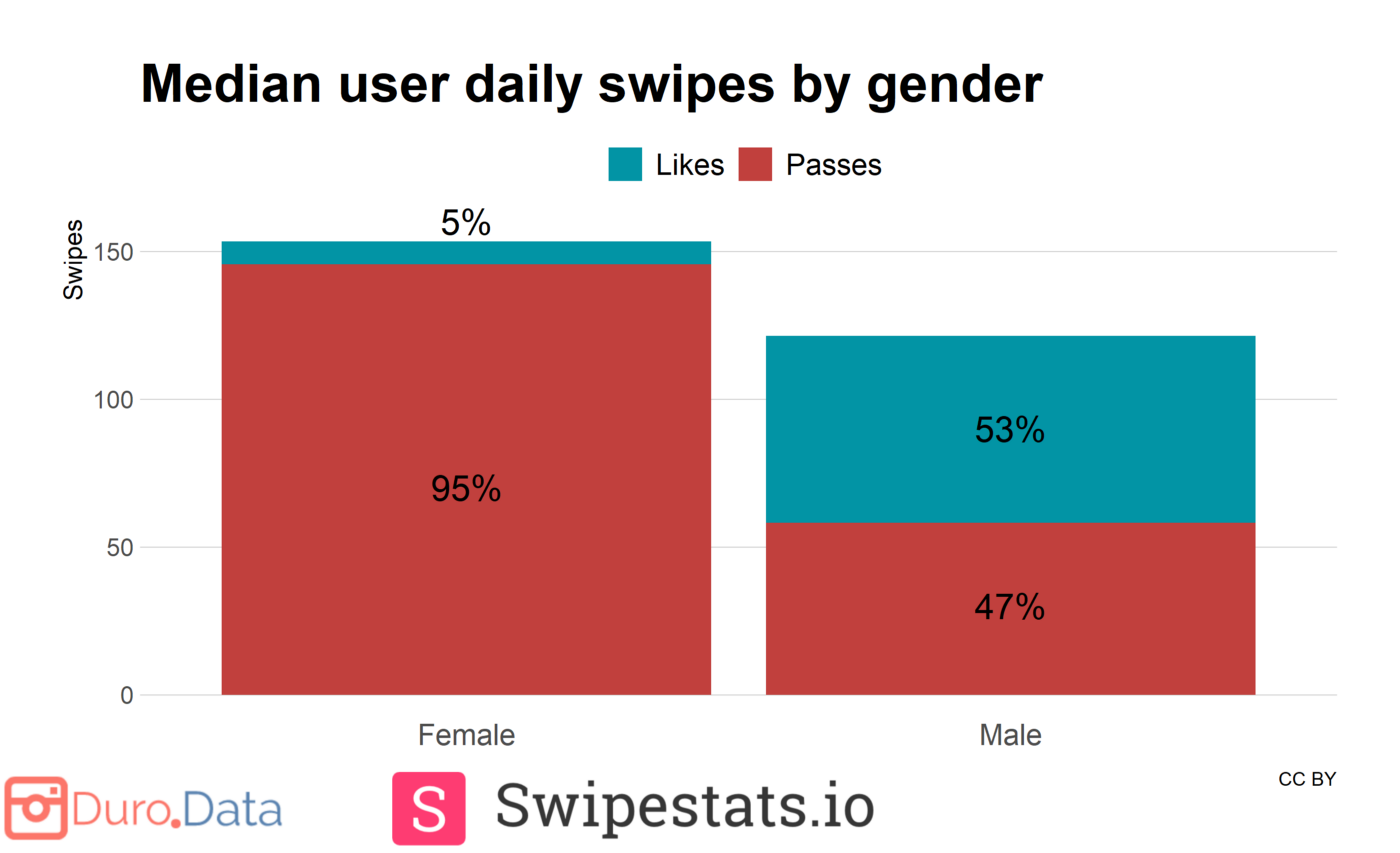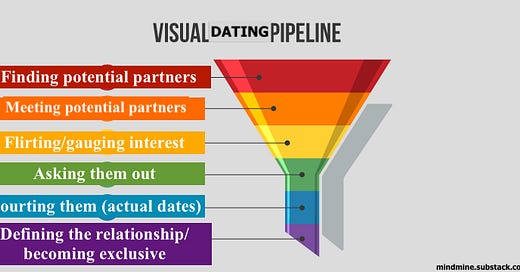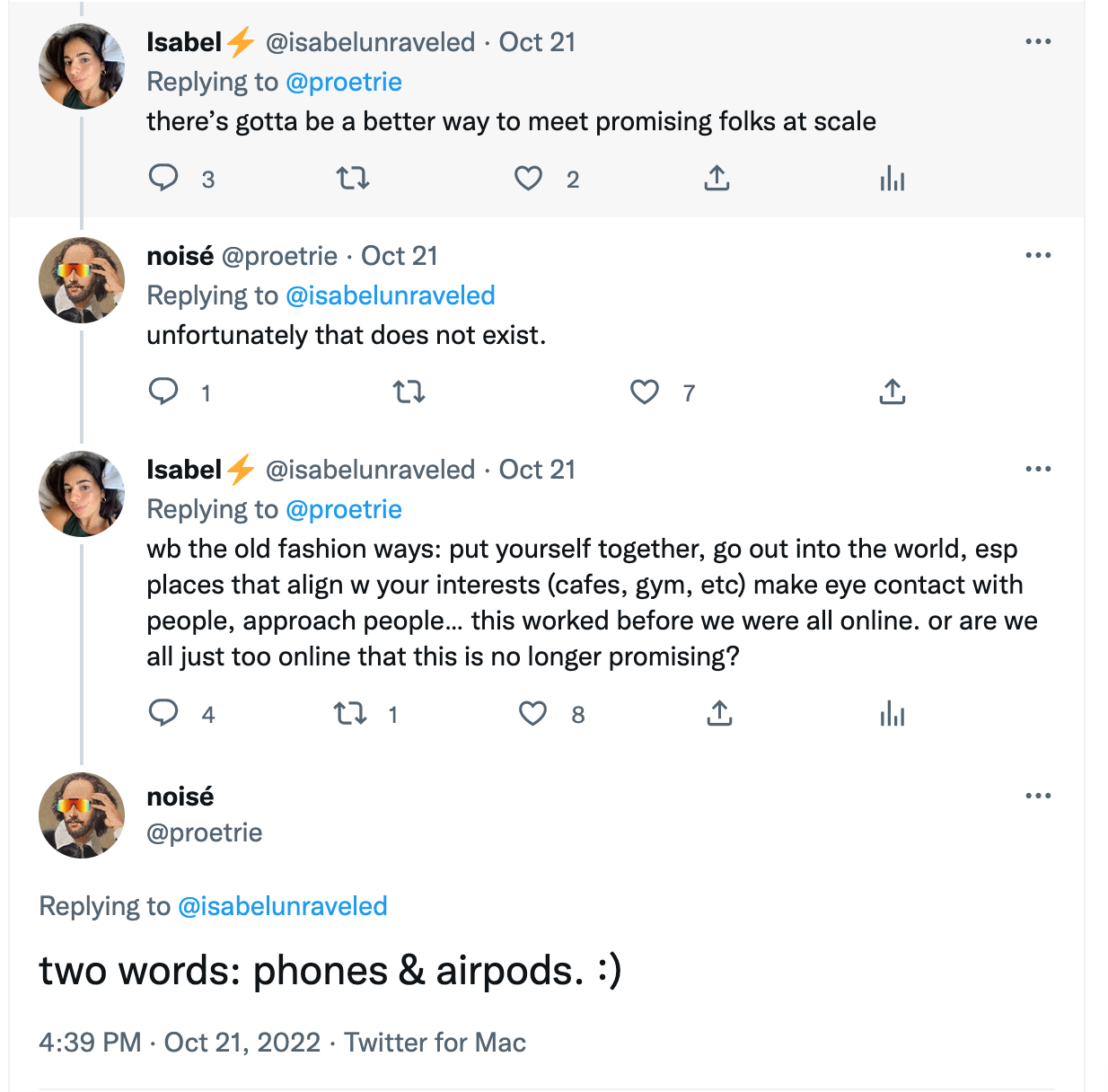I’ve been thinking about the challenges of modern dating a lot lately. Primarily because I have so many interesting, beautiful, smart friends—both men and women!—that are single and struggling fiercely to find a good match. It’s a multi-faceted problem that hits every stage of the dating pipeline: finding the right people, meeting them, courting them, maintaining/mining the connection, defining the relationship, entering a phase of exclusivity, and finally becoming “official.” It’s funny, because for most people, the end game of modern dating is the same as it has always been: end up with a life partner. But the process of getting there now is entirely different.
In addition to technology’s recent prominent role in dating, social shifts have made gauging the interest levels and intentions of the other party cloudy and nuanced. Even the terminology around dating is problematic and poorly defined. The definition of “dating” starts out as one thing when you’re 15—think: a 2010 Talylor Swift song.. a hug in the hallway, romantic birthday collages posted on each other’s facebook walls, the occasional make out in a friend’s basement at a high school party—and then it evolves into something else entirely as the seriousness of dating and courtship escalate as we mature. The terminology is confusing and daunting, making people avoid labels entirely. Labels come with baggage, implications, and weight that are easier to avoid than they are to unpack. Even the word “dating” is one that makes a lot of people shudder. What does it mean? It sounds scary, too “committal” for most. This leaves us in a place of abstraction, withdrawal and a load of further questions. The most pressing one being: why is modern dating so hard?
Note: this analysis primarily explores heteronormative dating, which is the source of the anecdotes, data and conversations included this piece.
Dating (defining relationship, exclusivity, gauging interest level of both parties):
Passion ≠ cool
We live in an age of being “uninvolved.” Our generation says: it’s cool to seem uninterested, uncommitted to things. Being “open to new experiences” is oh-so-in, while being ferocious about one thing is, largely, alarming. Being into someone or something implies you have some sort of… passion for something. Shudder. People fear the intensity that accompanies passion because it requires a commitment to something (that can be as trivial as a conversation or as significant as a career), that not everyone can match.
Dating is delicate. A huge part of it is meeting the other person where they’re at, refraining from accelerating things too quickly to ensure you don’t “scare off” the other person. Everyone is trying to develop feelings like a slow simmer rather than a rolling boil to avoid becoming vulnerable too quickly. Partially because you’re getting to know the feelings, partially because the feelings might not be reciprocated, and partially because you’re embarrassed that you have feelings for the person at all. Because feelings are a form of passion, and modern culture says: passion isn’t cool.
Options = good, commitment = bad
Dating is scary because it requires you to close doors, surrender your potential. This is the ultimate struggle of maturity: trading potential (possibility) for something tangible, and dating is the perfect illustration of the tight grip we have on our potential as young adults.
The outcome we’re optimizing for throughout youth is: how can we generate as many high quality options as possible? Everyone says: keep doors open so you can pick the best one. What we miss with this mindset, though, is that eventually you do have to pick one. And no one tells you what to pick, or when to shift from option ‘generation mode’ to ‘selection mode.’ So, this loop just keeps running indefinitely until you realize: wait, wasn’t the whole point of this to end up somewhere specific, somewhere great? This goes for career paths, friends, and especially for picking partners. Like: sure, you can get jacked, get educated, get a great job, increase your potential mating pool, but eventually—if you want a long-term partner—you have to pick. Otherwise you will cycle through plenty of amazing options, and in the meantime, get no closer to the final destination that most people are aiming at (a life partner!). Problematically, most people engage in dating while in option generation mode (widening their pipeline), vs. option selection mode (narrowing their pipeline). But it’s near-impossible to detect when someone is one vs. the other because…
Feelings are concealed—people are less willing to be upfront.
In the throes of modern dating, people are generally tentative, shying away from vulnerability and unwilling to expose themselves, because there is an implied mutual pursuit of optionality. Like: you’re on a date with me, I’m on a date with you. Presumably, we’re both dating (i.e. going on dates with other people). This makes it harder for someone to say: hey, this feels awesome, let’s hang out just us two from now on, yeah? Because there’s a higher chance the other person is seeing others and isn’t yet at that interest level. In the past, “dating” implied exclusivity, or at least the near-term possibility of it, whereas modern dating implies no such thing—if anything, it implies the opposite. Leading us to:
Relationships stay undefined: unclear when/how to define the relationship (DTR)
Because there is less evidence that the person is committed to you, it’s hard to know when/how to approach the DTR conversation. You don’t want to initiate it too early and scare them away, but it’s painful to be seeing someone when you’re unsure where you fall in their priority stack. This also makes it hard to gauge whether to advance the relationship. There is also less motivation to commit to a relationship because one of the original core value propositions of being with a partner is now taken care of. Specifically:
Getting validation is easier (mostly for women).
Attention, validation, and the feeling that you are special and valued is one of the core value propositions of being with someone. But now it can be collected in higher volume with lower effort, at scale (via social media, dating apps, etc.) So there is less incentive to “commit” to one person—why commit to one person and narrow your sources of validation when you can get it from multiple people at once, guilt-free? And you might say: if you knew who you were and had a strong sense of self, you wouldn’t need so much validation, which: true. Bringing us to:
Fluidity of self
People’s sense of self is more transient than it used to be (possibly due to the internet exposing us to all possible life paths and far more people than we would have ever seen in our lives previously, making us question ourselves more frequently/aggressively). This manifests itself in frequent job/career switches being common, and the “quarter life crisis” becoming a cornerstone experience for the early/mid 20’s crowd. Since most people’s sense of self is transient, they are not ready to commit to a long term partner because they don’t yet know who they are themselves. Once people do begin crystalizing their identity, they become more likely to commit.
There’s that classic notion of someone deciding they are ready to settle down and then marrying the next person they meet. This Sex and the City dialogue so perfectly encapsulates the phenomenon of ‘dating without the intention to settle down’:
Charlotte: Sometimes you just know, it's like, magic, it's fate.
Miranda: It's not fate, his light is on, that's all.
Charlotte: What light?
Miranda: Men are like cabs, when they’re available their light goes on. They awake one day and decide they are ready to settle down, have babies, whatever, and they turn their light on. Next woman they pick up, boom, that' the one they'll marry. It's not fate, it's dumb luck.
Charlotte: I'm sorry, I refuse to believe that love is that random.
Miranda: Please, it's all about timing. You gotta get them when their light is on.
Carrie: All the men I meet are flashing yellows.
Miranda: Or off duty. They can drive around for years picking up women and not be available.
Carrie: Then, they really shouldn't be allowed to get behind the wheel.
While I don’t agree with the entire sentiment of this take, I do think timing plays a huge role in modern dating. And this is not something that just men do, either. Today this notion of ‘driving around when your light isn’t on’ is common across the board. People are driving around all day, picking people up, dropping them off, and it’s impossible to know the state of their light. Their willingness to commit only comes out once they are explicitly asked or once someone tries to define the relationship and the disparity in expectations is exposed.
Pre-dating (finding, meeting, approaching):
Most people do not like the primary option for meeting potential partners: dating apps.
My peers that want to *actually find a partner* struggle with dating apps because they’re soaking a lot of effort into someone they know very little about (you have a few pictures, less than 100 words of superficial information and a couple virtual exchanges before you go on a date with this person). My male friends say that a lot of the girls on dating apps are there “just to go on dates,” and my female friends are overwhelmed by the amount of inbound attention they get and struggle to narrow their pool down effectively. The option asymmetry here creates a strange dynamic where men are likely to end up getting “yes”es from women that are just “there to go on dates”, while the women genuinely interested in finding partners get overwhelmed and give up, or get poached quickly, limiting the pool of date-able women on the platform.
Data from Tinder shows that women swipe yes to just one in 20 men, while the majority of men swipe yes more often than not.

Graph by Brayden Gerrard via Duro.Data and Swipestats.io/CC BY Additionally, because of social media and dating apps, men are seeing far more beautiful women than they have ever seen, raising their expectations for what they hope their potential partner will look like. Meanwhile, these apps swaddle extremely beautiful women with attention and validation, making them nearly impossible to reach for the average male to access. This attention-inflation seeps out to almost all women, while men struggle to get the attention of women at all. This can be seen in another interesting piece of data:
“An experiment with Tinder found that the bottom 80% of men (in terms of attractiveness) are competing for the bottom 22% of women and the top 78% of women are competing for the top 20% of men.” 1
This asymmetry in the male-female experience on the apps, plus the impersonal nature of “meeting someone” through a dating profile is enough to turn many high potential partners off of them. But the alternatives are not ideal either:
People rely on “miracle meet-cutes”
Given the challenges with dating apps, many people get discouraged and resort to “hoping” they will meet someone out in the wild (cafe, restaurant, gym… the old fashioned way!), which would be much more promising if the next point weren’t true:
Everyone is on do not disturb irl (airpods + phones)
Probably like you, I’ve been thinking: there must be a better way to meet people than dating apps. Why don’t people approach anyone in public anymore?
This exchange gave me my answer, which was validated immediately afterwards when I had two people messaging me saying it’s near-impossible to make eye contact in public anymore. So, technology has made serendipitous circumstances harder to harness, leaving people hoping for what is essentially a “miracle” in the wild:
(1) a non-plugged-in potential partner that
(2) you want to approach, and
(3) welcomes the approach warmly.
These are three conditions that are hard to satisfy post-college where people are more hesitant to trust strangers and let people in. However, assuming that all of these conditions hold true and you are in a situation like this, you still need to solve for:
Flirting
 the question one should try to answer with flirting is: what's the minimum viable way i can indicate interest in this person? if you do that & it's well-received, you can continue inching forward in your expression of interest, taking note of how each advancement lands with them
the question one should try to answer with flirting is: what's the minimum viable way i can indicate interest in this person? if you do that & it's well-received, you can continue inching forward in your expression of interest, taking note of how each advancement lands with themGauging/indicating interest in a new or unfamiliar potential partner is challenging, at baseline. But in modern dating, the lines feel even more delicate, because people are ultra-cautious about offending others, and both sides really just don’t know how to flirt (I intend to write more on this).
Platonism:
Separately, there is the prospect of going from platonic friend → more than friend, but this, too, is hard to execute. There are all the obvious When Harry Met Sally risks of ruining the friendship: (1) one person confesses romantic interest and it’s not reciprocated, (2) mutually crossing a line without the intention of pursuing the connection romantically could ruin the friendship, and (3) heightened fear of rejection due to caring more than usual what the person thinks (since they are your friend).
There’s that excellent Seinfeld bit where Jerry and Elaine unpack the delicate nature of friendships with a bit of underlying spice. This dialogue never gets old, and is the basis of one of my favourite Wale songs, The Need to Know:
Upon outlining the key factors that make modern dating so challenging, it’s clear that the issue is layered, complex and hard to rectify. It’s everything from social themes changing (no longer cool to be “into” someone → people fail to admit interest openly, are slower to commit, harder to gauge seriousness of both parties), to the reduction in serendipity due to technology (everyone is on do not disturb), to the delicate nature of flirting (people are more cautious about crossing a line). The problems with modern dating plague anyone trying to find someone, no matter how serious they are about their search, which is perhaps why you see a new dating app popping up every other week. Everyone is thinking: there must be a better way.
Expert daters will probably tell you that the best approach is getting as many reps in as possible—both irl and on dating apps (to reduce fear of rejection and maximize probability of closing on a prospect), as well as getting set up through mutuals. But this is hard to do. So, after listening to the heartache of modern dating as well as examining these imperfect solutions, I couldn’t help but wonder: how can we equip young people with the best possible tools, skills, and information to navigate the tumultuous battlefield of modern dating?
I intend to tackle this question by writing about specific problems and potential solutions within the larger scope of modern dating (i.e. flirting, seduction, sustainable relationships) in future pieces.
PS - say hi on Twitter if this resonated! And if you enjoyed this, you might be interested in a related piece I wrote: crushes are often just misplaced ambition.






24 yo 7/10 guy meets 24 yo 7/10 girl. They're objectively 99%ile in compatibility.
Woman thinks: I can go on dates with 100 8.5/10 guys in the next 6 months if I want. Won't I be able to seduce one of them into sticking around?
Man thinks: Every day I wait, I get richer and higher status. If I bide my time and re-enter the market in eight years, won't I have 100 8.5 girls eating out of my hands?
So they both pass. Women have variance/luck/volume on their side. Men have time on theirs. Each is tempted to play his advantage to get a better deal than he warrants.
"Tools, skills, and information" will only make this worse. People need to get less strategic, not more. In the past, many guys married the girl they knocked up while drunk. Girls would marry the local guy whose family her own got along with. These are perfectly good heuristics for a society to have.
They are precisely because it really doesn't matter. For most people, life with a 90% compatibility partner will be indistinguishable from life with a 99% compatibility partner. Most people are BORING LOSERS and will have boring loser lives literally no matter which partner they choose. Perpetually seeking the 99.99%ile partner who will save them from their boring loserdom is key troublemaker - no one wants to settle for someone in his own league, because doing so forecloses the option of being rescued from his mediocrity.
Hence, they just wait until their 30s, when their mediocrity is so totally obvious that the jig finally becomes up. Narcissism + puerile wishful thinking + options, not a lack of information.
phones + airpods = excuse for lack of confidence